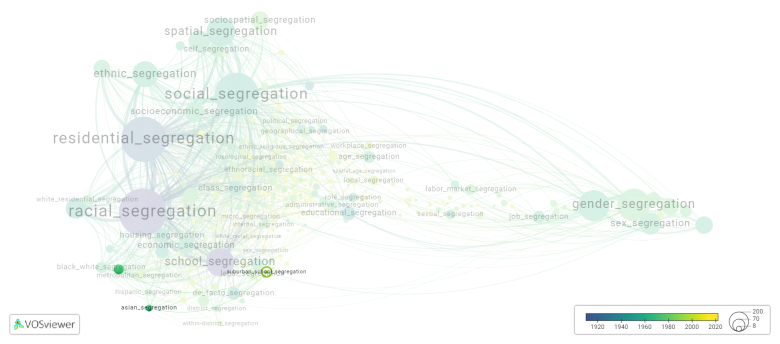Suburban school segregation: Difference between revisions
(Creating page) |
(Creating page) |
||
| (3 intermediate revisions by the same user not shown) | |||
| Line 9: | Line 9: | ||
Suburban school segregation is frequently discussed in the literature with the following segregation forms: | Suburban school segregation is frequently discussed in the literature with the following segregation forms: | ||
[[ | [[school segregation]] | ||
[[File:suburban_school_segregation.png|780x780px]] | [[File:suburban_school_segregation.png|780x780px]] | ||
This visualization is based on the study [[Segregation_Wiki:About| The Multidisciplinary Landscape of Segregation Research]]. | |||
For the complete network of | For the complete network of interrelated segregation forms, please refer to: | ||
* [https://tinyurl.com/2235lkhw First year of publication] | |||
* [https://tinyurl.com/2d8wg5n3 Louvain clusters] | |||
* [https://tinyurl.com/223udk5r Betweenness centrality] | |||
* [https://tinyurl.com/244d8unz Disciplines in which segregation forms first emerged (Scopus database).] | |||
==References== | ==References== | ||
==Notes== | ==Notes== | ||
Latest revision as of 07:17, 16 October 2024
Date and country of first publication[1][edit | edit source]
2001
United States
Definition[edit | edit source]
Suburban school segregation refers to the phenomenon in which schools located in suburban areas have disproportionately high percentages of either white or wealthy students, while schools in the same district that are located in urban or low-income neighborhoods have disproportionately high percentages of students of color or lower-income students. This segregation often occurs as a result of housing patterns, school district boundaries, and socioeconomic disparities, which lead to unequal access to resources and opportunities for students in different schools. Suburban school segregation can perpetuate inequalities in education, achievement, and life outcomes for students from marginalized communities. Efforts to address suburban school segregation may include strategies to promote diversity in schools, revise school attendance boundaries, and allocate resources more equitably.
See also[edit | edit source]
Related segregation forms[edit | edit source]
Suburban school segregation is frequently discussed in the literature with the following segregation forms:
This visualization is based on the study The Multidisciplinary Landscape of Segregation Research.
For the complete network of interrelated segregation forms, please refer to:
References[edit | edit source]
Notes[edit | edit source]
- ↑ Date and country of first publication as informed by the Scopus database (December 2023).
At its current state, this definition has been generated by a Large Language Model (LLM) so far without review by an independent researcher or a member of the curating team of segregation experts that keep the Segregation Wiki online. While we strive for accuracy, we cannot guarantee its reliability, completeness and timeliness. Please use this content with caution and verify information as needed. Also, feel free to improve on the definition as you see fit, including the use of references and other informational resources. We value your input in enhancing the quality and accuracy of the definitions of segregation forms collectively offered in the Segregation Wiki ©.
Suburban school segregation appears in the following literature[edit | edit source]
Reardon S.F., Yun J.T. (2001). Suburban racial change and suburban school segregation, 1987 95. Sociology of Education, 74(2), 79-101. American Sociological Association.https://doi.org/10.2307/2673164
Conwell J.A. (2016). Josephs without pharaohs: The du Boisian framework for the sociology of education. Journal of Negro Education, 85(1), 28-45. Howard University.https://doi.org/10.7709/jnegroeducation.85.1.0028
Preis D. (2022). Transportation access in U.S. suburban schools: a tool for equity or a revelation of race, class and privilege disparity?. Race Ethnicity and Education, -. Routledge.https://doi.org/10.1080/13613324.2022.2069740

